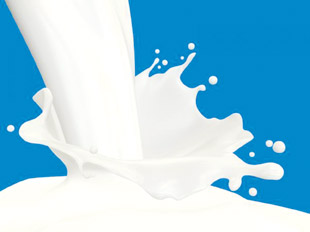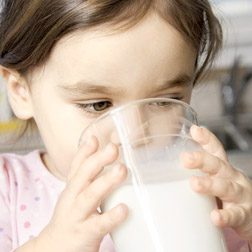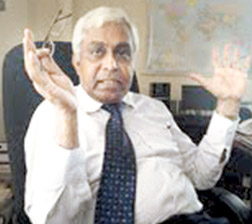|
Govt imposes strict guidelines on DCD and radiation
testing:
Milk powder controversy continues
By Kurulu Kariyakarawana
 The controversial milk powder crisis that ran for weeks is still
continuing when the Consumer Affairs Authority was ordered to test a new
batch of samples collected from the market, after considerably high
levels of Dicyandiamide was traced in two of the five imported milk
powder brands that were subjected to recent tests, prior to a decision
to be taken whether to ban it in Sri Lanka. The controversial milk powder crisis that ran for weeks is still
continuing when the Consumer Affairs Authority was ordered to test a new
batch of samples collected from the market, after considerably high
levels of Dicyandiamide was traced in two of the five imported milk
powder brands that were subjected to recent tests, prior to a decision
to be taken whether to ban it in Sri Lanka.
The crisis deepened when rumours started to spread that there is
something more in the milk powder crisis than a mere agro-chemical
contamination. This came to light with the statement made by UNP General
Secretary, Tissa Attanayake that this is one of the government's ploys
to increase milk powder prices.
JVP Parliamentarian, Anura Kumara Dissanayake said testing by the
Government is to drop certain foreign milk food importers who do not
abide by trade conditions laid down by the Government and to encourage a
few selected importers who are favourable to them.
Minister of Cooperatives and Internal Trade Johnston Fernando on
Thursday ordered a second test to be conducted on milk powder samples
found in the market following the three key points adopted at the recent
discussion held by the Food Advisory Committee.
The 19-member committee chaired by Director General Health Services,
Dr. Palitha Mahipala considering all the aspects involving the issue
adopted three important steps.
They were to inform all foreign milk powder importers to submit a
declaration certificate stating that the product was DCD free, test all
the new consignments that reached after March 2013 and to appoint a sub
committee to look into health hazards caused after consuming the milk
food and also to check toxic levels in milk powder and go through
relevant literature to introduce a minimum international standard of DCD
in the milk if there was any.
However, the World Health Organisation in response to the Department
of Health Services said that the amount of DCD found in milk powder was
minimal and cannot be considered harmful for human consumption. The WHO
was replying to a letter sent by the Department of Health Services a few
weeks ago requesting for details related to DCD and its effects. The WHO
also stated that there is no current international standard for DCD set
up yet.
However, the Consumer Affairs Authority was continuing tests of
levels of DCD found in milk regardless of the statement from the WHO
that there is no current standard limit for DCD and that such a minute
percentage would not harm humans at all.
 |
| |
No radioactive material in milk powder - AEA
|

Chairman AEA, Dr. Ranjith Wijeyawardena
|
The Atomic Energy Authority is another institute that tests milk
powder. Apart from the toxic chemicals that are believed to have been
mixed in the milk powder, AEA is testing whether the products have
radiation.
Testing milk food for radiation has been carried out for the past two
decades AEA Chairman, Dr. Ranjith Wijeyawardena assured that not a
single sample of radioactive milk powder was found during that period.
He said the necessity to test milk powder for radiation is important
since the Chernobyl Disaster in Ukraine in 1986, which is considered to
be the worst nuclear power plant accident in history and a large
quantities of radioactive particles were released into the atmosphere.
These particles with time have settled on soil and scientists believe
that large pastures of grass are also affected by it. The cows eating
that grass get the radiation in their body automatically and in the milk
they generate.
It is hazardous to health if humans especially children consume the
radioactive milk, Dr. Wijeyawardena said.
The AEA which is armed with the best nuclear scientists in the
country and millions of rupees worth of state-of-the-art equipment is
checking radiation food items like milk powder and canned fish. The
measurement used to measure the radiation is called Becquerel or Bq. The
international standard for milk powder is below 20 Bq and 100 Bq for
canned fish.
However, during the tests the AEA has not found any radioactive
samples of milk food which is similar to almost 0 Bq. Checking canned
fish for radiation began since the Fukushima nuclear disaster in 2011.
Where large amounts of sea water was used to cool the nuclear plant
which was later released back to the ocean with radioactive particles
where billions of fish consume this. |
Responding to this, the Director of Information, Consumer Affairs
Authority, Chandrika Thilakaratne told the Sunday Observer that testing
has to be done although there is no standard levels a yet. "DCD levels
were traced for the first time and although the amounts are minimal it
does not mean that it would not have an effect on humans in the long
run, especially children who consume it," she said.
The Consumer Affairs Authority had taken powders samples that are
imported which had been sent for laboratory tests last week. The samples
were sent to Singapore since we do not posses such advances laboratory
facilities at present to test and verify.
The inquiry has been initiated by Chairman CAA, Rumi Marzook
following a directive made by President Mahinda Rajapaksa after the
problem of contaminated milk food was reported through the media a few
weeks ago.
Declining to reveal the names of the five imported brands that were
subject to tests Ms. Thilakaratne said four of them were from New
Zealand and one from Australia. The CAA had obtained a report containing
the results of the laboratory tests which had been submitted to the Food
Advisory Committee who will take a final decision on the milk food
crisis.
She said although various tests are being carried out by the CAA,
SLS, ITI or AEI the final decision will be taken by the Food Advisory
Committee who had the sole authority to approve or prohibit food
products in the country.
Refusing to reveal the level of DCD found in the five tested milk
samples due to a standard security policy maintained by the items
subjected to tests by the CAA, Ms. Thilakaratne said the samples of the
five brands had been sent to the Food Advisory Authority under a special
coding.
It was following this move that Minister Johnston Fernando ordered to
conduct another test on the latest batch of milk powder imported after
March and that the samples were sent to at least three different
countries to get a comprehensive unbiased report, Ms. Thilakaratne said.
The crisis came to light in September 2012 when traces of DCD were
found in milk produced by New Zealand company Fonterra. The New Zealand
government, Fonterra and Federated Farmers of New Zealand moved quickly
to reassure the public and overseas buyers that there was no risk to
health. The levels were low and attempts were made to prevent the test
results from being reported in the media, foreign media reports stated.
Following these reports the Ministry of Health and CAA received a
number of public complaints that lead to initiating a comprehensive
investigation.
In the meantime attempts were made by the New Zealand milk importers
to convince the Ministry of Health and other relevant parties involved
in the investigation that the milk is hundred percent pure and free of
chemicals. Representatives from the New Zealand Ministry of Primary
Industries visited Sri Lanka in late April, who met officials of the CAA
and Atomic Energy Authority and requested to stop the investigations and
let the milk products flow as usual saying they are free of chemicals or
radiation.
Chairman Atomic Energy Authority, Dr. Ranjith Wijeyawardena told the
Sunday Observer that the two representatives repeatedly requested to
cease testing being carried out on the milk powder. They have said that
their country is clean and the grass that is consumed by cows to
generate milk is free of chemicals. This was confirmed by CAA Director,
Chandrika Thilakaratne who said that the same party even visited them
making the same request. The representatives have reportedly reiterated
the fact that their country does not use the agro-chemical DCD on grass.
However, the Food Advisory Committee decided to continue its tests
despite these interventions and found that some of the samples tested
contained considerable amounts of DCD.
Deputy Director General Public Health Services Dr. Sarath Amunugama
told the Sunday Observer that although there were no adverse effects
reported against DCD, earlier testing has to be done as a health
precautionary. He said considerable amount of DCD was found in two of
the five different samples of imported milk powder brands tested in a
special laboratory in Singapore. Because of that the tests had to be
continued and a special sub committee has been appointed to study
further into this.
What is DCD?
Dicyandiamide (DCD) also known as 2-Cyanoguanidine is a nitrogen
inhibitor in the form of an agro-chemical. It has been used in New
Zealand Since 2004 by farmers hoping to lower the environmental impact
of livestock by reducing the rate at which soil microbes convert ammonia
from animal urine into nitrates and nitrous oxide, thus slowing nitrate
leaching from pasture. |
The special sub committee comprise representatives of Consumer
Affairs Authority, Government Analyst Department, Sri Lanka Standard
Institute, Ministry of Health and City Analyst of the Colombo
Municipality. Meanwhile, importers of Anchor milk powder Fonterra Brands
Lanka Managing Director Leon Clement said that very low levels of DCD
detected in a small number of milk powder samples in New Zealand last
year were 100 times lower than tolerable daily intake guideline limits
established by the European Commission. At these levels, United Nations
data suggests that the table salt sitting in your kitchen is more of a
risk to humans than DCD. Issuing a general press release Clement
welcomed the Sri Lankan government's decision to re-test their samples
of imported milk powder. However it further stated that Independent and
internationally accredited testing laboratories - the Cawthron Institute
and AsureQuality have carried out hundreds of tests on New Zealand milk
powder produced since September 2012 and all of these tests have found
that New Zealand dairy products are hundred percent safe. And that the
DCD is no longer used in New Zealand farms. |


